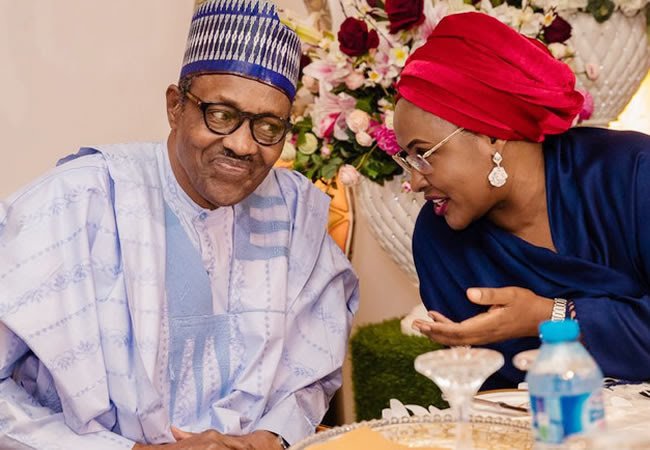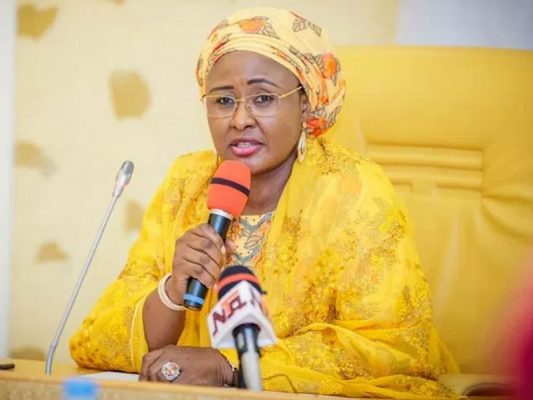The First Lady, Aisha Buhari says young people in Nigeria are angry because of “being left behind in education, economic opportunities, health and wellbeing during a crucial stage of their life”.
She stated this on Friday at a seminar to mark the 2020 United Nations UN Women’s campaign for 16 days of activism against GBV in Abuja.
“Many young people are now at risk of being left behind in education, economic opportunities, health and wellbeing during a crucial stage of their life.
”This is evidenced in the anger, protests, and demonstrations happening around the world as well as the violence, to which most victims are women and the youths themselves,” the First Lady stated.
Aisha Buhari, therefore, called for strategic partnership to end the raising cases of Gender-Based Violence (GBV) against women and girls in Nigeria.

The event was organized by the Secretariat of the African First Lady’s Peace Mission in collaboration with the office of Nigeria’s first lady.
Read Also: Insecurity: Kidnap victims must be compensated – Ex-Sokoto Gov tells Gbajabiamila
It was themed: “The first lady as leader and mobilizer of women and youths for peacebuilding, conflict Resolution and Resilience in the Post COVID-19 Era”.
Represented by the Senior Special Assistant to the President on Women Affairs and Administration, Dr. Hajo Sani, the first lady charged the wives of governors to expedite action to protect the rights of women and girls in their states.
“As a mother, I feel a sense of duty to make my contribution by sharing ideas with first ladies in the states who will eventually cascade the messages of the seminar to women and youth in their respective states.
“Many young people are now at risk of being left behind in education, economic opportunities, health and wellbeing during a crucial stage of their life.
”This is evidenced in the anger, protests, and demonstrations happening around the world as well as the violence, to which most victims are women and the youths themselves,” she said.
She, however, expressed the need to engage the women and youths for greater opportunities and peacebuilding.
“We, therefore, have a duty to mobilize women and youths for peacebuilding, community conflict resolution and resilience.
“Globally, the COVID-19 pandemic and its social and economic impact have created a global crisis unparalleled in history.
“Women and young people are particularly vulnerable to the disruptions the pandemic has caused,” she said.
On her part, the Minister of Women Affairs, Mrs. Pauline Tallen, urged stakeholders to join hands with the ministry to ensure sustainable progress on the program of girl-child education.
Tallen, who was represented by Mrs Jummai Idonije, also said the ministry will continue to create enabling environment for the girl-child to achieve their potentials.
”We must individually and collectively continue to emphasize education of the girl-child and promotion of second-chance education to address societal vices.”
Also speaking, the Chief Executive Officer of Nigerians in Diaspora Commission, Mrs. Abike Dabiri-Erewa, urged the wives of the governors to always engage the youths in positive conversations.
Dabiri-Erewa expressed the need for the youth to be encouraged to participate in politics.
”As mothers we need to mentor them, we in the diaspora commission look forward to working with the wives of governors to tap from the experiences of our youth in diaspora,” she said.
Read Also: FIRS generates N4.17trn in revenue in 10 months
In her remark, the Chairperson of the Governors Wives Forum, Mrs. Bisi Fayemi, said the forum appreciated the role of the first lady in supporting efforts to check violence against women and children.
Fayemi, however, said governors’ wives make giant strides in promoting the girl-child education and protection of the rights and privileges of women and youths in their respective states.
She, therefore, urged participants to partner with the forum to support the advocacy against GBV.
THe UN Women’s Generation Equality campaign is amplifying the call for global action to bridge funding gaps, ensure essential services for survivors of violence during the COVID-19 crisis.
The UN report says, even before COVID-19, violence against women and girls had reached pandemic proportions.
The report indicates that 243 million women and girls were abused globally by an intimate partner in the past year, while less than 40 percent of women who experience violence report it or seek help.



Leave a Reply